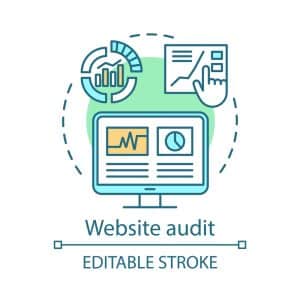In the dynamic world of the World Wide Web, your website’s performance guides you toward a thriving online presence. With website audits, you have the power not just to navigate but truly conquer the digital landscape. By understanding the ins and outs, from SEO intricacies to optimising the user experience, you’re poised for online excellence.
What Is a Website Audit?
A “website audit” might sound a bit technical, but it’s essentially like giving your website a health check to assess its performance on the internet. Improving your website’s visibility on Google is a crucial first step.
Website audits help find all the little problems that might be holding your website back from being visible online. Here are some things a website audit looks at from an SEO perspective:
- Technical SEO: This involves inspecting the inner workings of your website to ensure everything operates smoothly. It’s akin to examining your car’s engine to ensure it’s in good working order.
- On-page SEO: This pertains to evaluating each page on your website to confirm they contain the appropriate keywords and other essential elements assessed by the search engines. It’s similar to ensuring you use the right words in your book to make it captivating.
- Website structure: This entails assessing if your website is structured in a way that is logical for both users and search engines. Think of it as organising your books on a shelf to locate them quickly in an organised manner.
- Potential off-site issues: Take a peek at what other websites say about yours; your reputation primarily comes from reviews through Google, Yell and Trustpilot. The links you receive from other websites are also vital. You want positive and reputable sources associated with you, so identifying potentially harmful sources will allow for decisive action.
- Content gaps and opportunities: Figuring out what content you might be missing on your website that is important to building your credibility and then making it in a way that supports the products and services you offer in a way that gains enhanced search visibility, is foundational to an effective SEO strategy.
Why Do You Need a Website Audit?
Search Engines are undergoing significant changes, with AI-generated search results becoming a welcome addition to the user experience. Staying ahead of the competition and ensuring your online presence remains effective is essential. This is where a website audit becomes invaluable. Let’s delve deeper into the reasons why you need one:
to the user experience. Staying ahead of the competition and ensuring your online presence remains effective is essential. This is where a website audit becomes invaluable. Let’s delve deeper into the reasons why you need one:
Maintaining Relevance: What proved successful for your website a year ago might yield different results today. A website audit is your safeguard to ensure that your content, design, and SEO strategies stay relevant and aligned with the ever-evolving industry trends and user preferences.
Enhancing User Experience: Your website is your virtual shopfront, and the user experience it provides is crucial. A website audit helps identify and rectify issues that may be causing frustration for your visitors. This can lead to improved engagement, longer time spent on your site, and higher conversion rates.
Boosting SEO Performance: Search engines continuously update their algorithms. An audit ensures you stay current with these changes and confirms that your website adheres to best practices. Enhanced SEO leads to improved visibility in search engine results, ultimately attracting more organic traffic to your site.
Increasing Conversion Rates: A well-optimised website draws visitors and persuades them to take action. You can identify and eliminate conversion barriers through a website audit, resulting in more leads, sales, and revenue.
Identifying Technical Issues: Technical glitches or errors on your website might be hidden from view behind the scenes. These issues can significantly impact your site’s performance and user experience. A website audit uncovers and addresses these hidden problems, ensuring a smoother experience for your visitors.
Staying Ahead of Competitors: Your competitors continually strive to gain an edge. Regular website audits allow you to benchmark your performance against theirs. This competitive insight empowers you to adapt and innovate, ensuring you stay ahead in the race for online supremacy.
Data-Driven Decision-Making: A website audit equips you with valuable data and insights, enabling informed resource allocation, strategy prioritisation, and website optimisation for maximum impact.
Improved Security: The online landscape is rife with security threats. A website audit can uncover vulnerabilities that make your site susceptible to cyberattacks. Addressing these issues enhances the security and trustworthiness of your website.
Enhanced Mobile Experience: With the proliferation of mobile devices, having a mobile-friendly website is no longer optional. A website audit ensures that your site is responsive and provides an excellent experience for mobile users.
Optimal Performance: A sluggish website can drive visitors away. A website audit helps you identify and rectify performance bottlenecks, resulting in faster load times and a smoother browsing experience.
A website audit guides you toward improvements that can transform your website from merely existing online to thriving and excelling. It’s an investment in your online success, and the benefits it brings are well worth the effort.
FAQs and Wrapping Up
What is a website audit, and why is it important?
A website audit is a comprehensive analysis of a website’s performance, structure, and content to identify issues and areas for improvement. It’s important because it helps uncover problems that hinder SEO, user experience, and conversions, allowing for effective optimisation.
How often should I conduct a website audit?
The frequency of website audits depends on your website’s size and industry. Generally, conducting a full annual audit is a good practice. However, ongoing monitoring and mini-audits can be performed more frequently to address emerging issues.
What tools can I use for a website audit?
Various website audit tools are available, such as Google Analytics, Google Search Console, Screaming Frog, SEMrush, Ahrefs, and more. The choice of tools depends on your specific needs and preferences.
What are the key areas to focus on during a website audit?
A website audit should cover technical SEO, on-page SEO, content quality, user experience (UX), mobile-friendliness, backlink profile, and security. These areas collectively impact a website’s performance.
How do I improve my website’s SEO through auditing?
To improve SEO, address technical issues like broken links and page speed, optimise on-page elements for relevant keywords, create high-quality content, and earn quality backlinks. Regular audits help track progress.
What is the role of user experience (UX) in website auditing?
UX plays a significant role in website auditing, affecting how visitors interact with your site. A positive UX can increase conversions and improve SEO rankings—audit UX elements like page load times, navigation, and mobile responsiveness.
How can I measure the success of a website audit?
Success can be measured through various metrics, including improved search rankings, increased organic traffic, higher conversion rates, reduced bounce rates, and better user engagement. Tracking these metrics before and after an audit helps gauge success.
Is website auditing a one-time process, or should it be ongoing?
Website auditing should be an ongoing process. The digital landscape evolves, and websites require continuous optimisation to stay competitive. Regular audits help ensure your site remains effective and up to date.
Can I perform a website audit myself, or should I hire a professional?
Both options are possible. Small websites with simple structures can be audited by site owners using free tools. However, hiring an experienced SEO professional or agency is often recommended to audit larger, more complex websites thoroughly.
What are the benefits of hiring a professional for a website audit?
Professionals bring expertise and experience to identify issues, implement best practices, and provide tailored recommendations. They can uncover hidden problems and offer strategies for long-term growth and success.
Throughout this comprehensive guide, we’ve explored the multifaceted journey of website auditing. We’ve deciphered the significance of technical assessments, content quality checks, and the vital role of SEO in enhancing your website’s performance.
As you start your website auditing journey, remember that the digital landscape is dynamic. Regular audits ensure your website stays aligned with ever-changing algorithms, user expectations, and market trends. This iterative approach and insights gained from each audit will empower you to optimise your online presence continually.
We hope this guide has been valuable in your pursuit of a robust and optimised online presence. Happy auditing!

